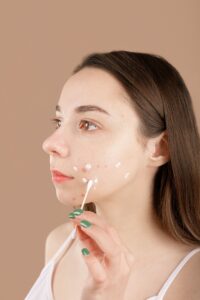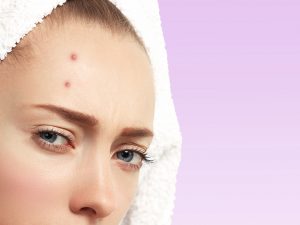The Ultimate Guide to Healthy Skin

Are you tired of dealing with hormonal acne? You’re not alone. Hormonal acne affects millions of people worldwide, but the good news is that it can be managed with the right skincare tips and products. In this article, we’ll explore the root causes of hormonal acne and provide you with effective solutions to help you achieve healthy, clear skin.
Understanding Hormonal Acne: Causes and Triggers
Hormonal acne is a type of acne that is triggered by hormonal fluctuations in the body, specifically an increase in androgens such as testosterone. This type of acne typically appears around the chin, jawline, and neck area and is more common in women than in men. Hormonal acne can be triggered by a variety of factors such as stress, diet, and medications.
One of the root causes of hormonal acne is an excess production of sebum, which is the oil that is produced by the sebaceous glands in the skin. When too much sebum is produced, it can clog the pores and lead to acne breakouts. Hormonal fluctuations can increase sebum production, leading to acne breakouts in people who are predisposed to acne.
Another trigger of hormonal acne is stress. When you’re stressed, your body produces more cortisol, which can stimulate the sebaceous glands to produce more oil. This can lead to acne breakouts, especially in individuals who are prone to acne.
Diet can also play a role in hormonal acne. Eating a diet high in sugar and processed foods can lead to increased inflammation in the body, which can trigger acne breakouts. Additionally, dairy products have been linked to hormonal acne in some individuals, so it may be worth reducing your intake of dairy if you’re experiencing acne breakouts.
Effective Skincare Tips for Hormonal Acne
Use Gentle, Non-Comedogenic Skincare Products
When dealing with hormonal acne, it’s important to avoid using harsh skincare products that can irritate the skin and cause further breakouts. Look for products that are labeled as non-comedogenic, meaning they won’t clog your pores. Additionally, choose products that are gentle and free from harsh chemicals such as sulfates and parabens.
Keep Your Skin Clean
Keeping your skin clean is crucial when dealing with acne. Use a gentle cleanser twice a day to remove excess oil and dirt from your skin. Avoid scrubbing your skin too hard, as this can irritate your skin and cause further breakouts.
Exfoliate Regularly
Exfoliating your skin can help to unclog pores and remove dead skin cells. However, be gentle when exfoliating and avoid using harsh scrubs that can irritate your skin. Look for exfoliating products that contain salicylic acid or alpha-hydroxy acids, which can help to unclog pores and reduce inflammation.

Products That Can Help Manage Hormonal Acne
Benzoyl Peroxide
Benzoyl peroxide is a topical medication that can help to kill acne-causing bacteria and reduce inflammation. It’s available in various strengths and can be found in cleansers, spot treatments, and creams.
Salicylic Acid
Salicylic acid is an exfoliating ingredient that can help to unclog pores and reduce inflammation. It’s available in various strengths and can be found in cleansers, toners, and spot treatments.
Retinoids
Retinoids are a type of vitamin A derivative that can help to reduce inflammation and unclog pores. They’re available in various strengths and can be found in creams, gels, and serums.
Our Pick
- 100% Pure Tea Tree Deep Detox Mask
- Jan Marini Benzoyl Peroxide 5%
- Sunday Riley A+ High-Dose Retinoid Serum
In conclusion, hormonal acne can be a frustrating and challenging condition to deal with, but with the right skincare tips and products, it can be managed effectively. It’s important to understand the root causes of hormonal acne and to adopt a holistic approach to managing it, including a healthy diet, stress management techniques, and effective skincare practices.
Remember to be patient and consistent with your skincare routine, as it can take time to see results. If your hormonal acne persists despite your best efforts, consider consulting a dermatologist who can provide personalized advice and treatment options.




